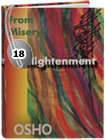In the Silences, the Semi-Colons and the Full Stops...
TrackFrom Misery to Enlightenment
In stock
"The most significant thing about enlightenment is that it is the most insignificant thing in the world.
"The scriptures are full of great attributes, qualities, about enlightenment. It is the highest peak human consciousness has..."
"The scriptures are full of great attributes, qualities, about enlightenment. It is the highest peak human consciousness has..."
"The most significant thing about enlightenment is that it is the most insignificant thing in the world.
"The scriptures are full of great attributes, qualities, about enlightenment. It is the highest peak human consciousness has..."
Osho continues:
"The scriptures are full of great attributes, qualities, about enlightenment. It is the highest peak human consciousness has..."
"In fact to say 'you' and 'nature' is not right, but what to do if all the languages are wrong? You are nature. 'You' does not make you a separate entity. You can call yourself a thousand and one names; still you will remain the same forever.
"So although very great scholars, pundits, theologians, philosophers, even the so-called mystics, have described home-coming as one of the attributes of enlightenment, ninety-nine percent of these people are simply unaware of what they are saying. When there has been no departure, how can you talk of arrival? But these ninety-nine are only knowers of words, scriptures, principles, philosophies; they can be forgiven.
"The real trouble is with the one percent, the mystics. But they have also to be forgiven for the simple reason that language is so impotent. What can the mystic do? He wants to give you a certain sense of being yourself, but there has been a gap; you were present but you were unaware. You were at home but fast asleep and dreaming of faraway lands, fairylands, utopias, paradises.
"The word paradise reminds me that it is very ugly. It was used in Persia for the gardens of the kings. In Persian, firdaus means a walled hunting garden. In countries like Persia gardens can only be walled. They have to be protected from the desert, and only kings could afford them. They could live in deserts as if they were living in gardens; for miles they could manage to have walled gardens.
"And of course for their joy, play, entertainment, all kinds of wild animals were brought into their gardens. And they were living very freely – of course within the border, within the wall, but it was a vast territory. And the kings used to hunt those imprisoned wild animals. It was sheer slaughter. They could not escape, they could not go anywhere. They were caught anyway, and above all they were being slaughtered.
"From firdaus comes the English word paradise. They have forgotten about the hunting completely, they have only remembered the walled, beautiful gardens of the kings. But the purpose was hunting; the garden was secondary. But that has been forgotten in English completely; otherwise it will be very difficult to describe paradise."
"So although very great scholars, pundits, theologians, philosophers, even the so-called mystics, have described home-coming as one of the attributes of enlightenment, ninety-nine percent of these people are simply unaware of what they are saying. When there has been no departure, how can you talk of arrival? But these ninety-nine are only knowers of words, scriptures, principles, philosophies; they can be forgiven.
"The real trouble is with the one percent, the mystics. But they have also to be forgiven for the simple reason that language is so impotent. What can the mystic do? He wants to give you a certain sense of being yourself, but there has been a gap; you were present but you were unaware. You were at home but fast asleep and dreaming of faraway lands, fairylands, utopias, paradises.
"The word paradise reminds me that it is very ugly. It was used in Persia for the gardens of the kings. In Persian, firdaus means a walled hunting garden. In countries like Persia gardens can only be walled. They have to be protected from the desert, and only kings could afford them. They could live in deserts as if they were living in gardens; for miles they could manage to have walled gardens.
"And of course for their joy, play, entertainment, all kinds of wild animals were brought into their gardens. And they were living very freely – of course within the border, within the wall, but it was a vast territory. And the kings used to hunt those imprisoned wild animals. It was sheer slaughter. They could not escape, they could not go anywhere. They were caught anyway, and above all they were being slaughtered.
"From firdaus comes the English word paradise. They have forgotten about the hunting completely, they have only remembered the walled, beautiful gardens of the kings. But the purpose was hunting; the garden was secondary. But that has been forgotten in English completely; otherwise it will be very difficult to describe paradise."
| Publisher | Osho International |
|---|---|
| Duration of Talk | 93 mins |
| File Size | 23.62 MB |
| Type | Conversa Individual |



The information below is required for social login
Sign In or Create Account
Create New Account